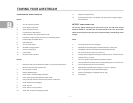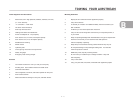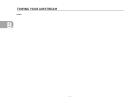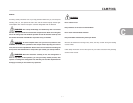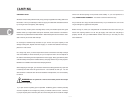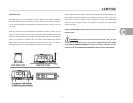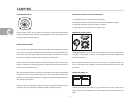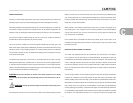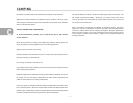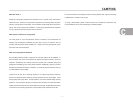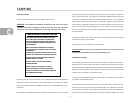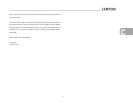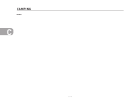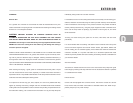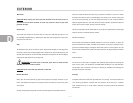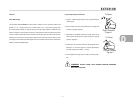
C
CAMPING
C - 6
the walls or the ceiling where it will manifest itself as warped or stained panels.
Appearance of these conditions may indicate a serious 1 problem. When you recog-
nize the signs of excessive moisture and condensation in the trailer, action should be
taken to minimize their effects.
TIPS TO CONTROLLING CONDENSATION
To avoid condensation problems, try to follow these tips to help alleviate
excess moisture.
Allow excess moisture to escape to the outside when bathing, washing dishes, hair
drying, laundering, and using appliances and non-vented gas burners.
Always use the vent hood when cooking.
Keep the bathroom door closed and the vent or window open when bathing and for a
period of time after you have finished.
Do not hang wet clothes in the trailer to dry.
In hot weather, start the air conditioner early as it removes excess humidity from the air
while lowering the temperature.
Keep the temperature as reasonably cool during cold weather as possible. The warmer
the vehicle, the more cold exterior temperatures and warm interior temperatures will
collide on wall surfaces, thus creating condensation.
Use a fan to keep air circulating inside the vehicle so condensation and mildew cannot
form in dead air spaces. Allow air to circulate inside closets and cabinets (leave doors
partially open). Please keep in mind that a closed cabinet full of stored goods prevents
circulation and allows the exterior temperature to cause condensation.
The natural tendency would be to close the vehicle tightly during cold weather. This
will actually compound the problem. Simply put, you need to remove some of the
warm air, and allow some cool outside air to get inside the vehicle, so the furnace will
not recycle the humid interior air.
Note: Your trailer is not designed, nor intended, for permanent housing. Use of this
product for long term or permanent occupancy may lead to premature deterioration
of structure, interior finishes, fabrics, carpeting, and drapes. Damage or deterioration
due to long-term occupancy may not be considered normal, and may under the terms
of the warranty constitute misuse, abuse, or neglect, and may therefore reduce the
warranty protection.



